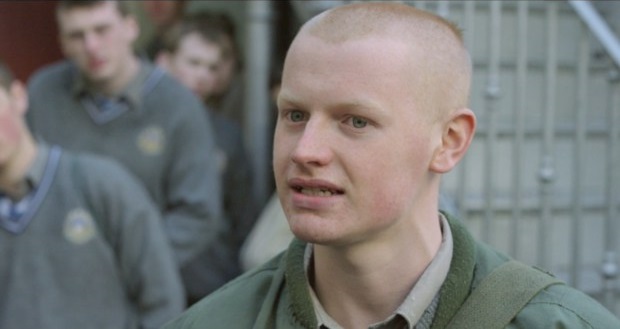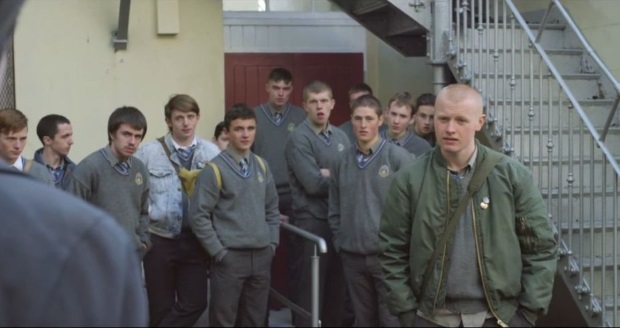Sing Street, and a Small Detail That Really Matters
The brilliant Sing Street has an awful lot to love about it - and there's a small detail that deserves particular praise. Spoilers ahead.
This article comes from Den of Geek UK.
Back in 2016, the quite brilliant Sing Street opened in UK cinemas against the quite not-brilliant X-Men: Apocalypse, with pretty predictable results. The big, clunky blockbuster with the massive marketing budget steamrollered the brilliant musical comedy with real heart.
Thankfully, though, Sing Street has found a continued life, as word of mouth is leading more and more people to discover this utter joy of a movie. Take these opening two paragraphs as a huge recommendation for the film if you’ve not had the pleasure yet, and I’d skip the rest of the article, as it’s about to get spoilery. Much love to you.
Still here?
Okay. I think if you want to change the world of people in a film, to shift perspectives, you often have to do it in the midst of something big and mainstream. Look at how wonderfully Mrs. Doubtfire took a little of the sting out of divorce for children. Or what The Full Monty did – in the clothes (or lack of) of a huge mainstream comedy – to address suicide, loneliness, and the aftermath of an industry collapsing.
Sure, there are brilliant documentaries and lower profile films that have a huge impact too. But also, I think it’s no coincidence that lots of difficult issues that human beings face are raised, for instance, in soap operas. Be as snooty as you like towards soaps – I certainly have been in the past – but when they address real issues with sensitivity, they really can change someone’s life for the better.
Anyway: I was bullied at school. Not a massively unusual tale there. I wasn’t physically bullied, rather that people used to go for how I looked, how much I weighed, and take enormous glee in metaphorically punching me at every opportunity. And when you’re a teenager, not quite understanding why people are being so relentlessly horrible to you, it can be a very dark, unpleasant place.
Age brings with it lots of things, from decreasing amounts of hair through to greater amounts of perspective. And thus I’m coming to Sing Street, a film that addresses something I wish a movie had tackled in the same way when I was a kid.
When I was growing up, the school bullies on the screen were on Grange Hill, and they were what they were. Imelda, Mauler, Gripper: they sneered at you, wanted your money, wanted to hit you. They still terrify me to various degrees. In Sing Street, then, at first glance there’s a bully in the Grange Hill tradition. It’s the character of Barry, played superbly by Ian Kenny.

We first meet Barry early in the film, just over 11 minutes in, as he punches our protagonist, Conor, in the face and nicks his chocolate bar. It’s a fortuitous meeting in a way, as Conor gets to make his first friend at his new school: Darren. And it’s Darren that gives a hint at what lies ahead. “You’ve shown signs of weakness”, explains Darren, of why Barry has picked on him. When Conor queries more of Barry, Darren explains that “his ma and da are drug addicts”.
It’s a throwaway comment, and Barry is your standard two dimensional school bully at this stage. But half an hour into the film, Conor and his friends are making a music video around the back of some houses, when Barry and his dad encounter them. They’re walking back from a shop, his dad carrying what looks like a bag of beer. When his dad suggests to Barry that he should be in the band and start wearing lipstick, Barry jokingly retorts “piss off”. And then the tone of the film suddenly, briefly shifts as his dad turns around and punches his son in the face.
Barry appears a couple more times in the film, and whilst he’s not a major character, he’s an important one for me. Narratively, the moment when Conor finally stands up to him is a big punch-the-air moment in the movie. But the bit that chokes me up lies ahead. For as the film hits its final strait we pay a visit to Barry’s house, and see the extent to which the bully is bullied. We see that he’s living in a toxic environment, that his behaviour is a reflection of his home life. That the bully is actually being bullied.
I learned later in life that one of the people who bullied me an awful lot was having a very bad time at home. That didn’t give that person the right to take their problems out on me, and to make my life pretty near insufferable for a while. But conversely, I’d never considered that they too may have had problems. I just saw their rage in my direction, and did all I could to duck.
Nobody, when I was growing up, was talking about who bullies bullies. I do think, though, that to break any cycle, such conversations need to be had. Had I seen a different perspective when I was younger, would it have changed anything? Maybe. Probably not. I’d like to think that in the quieter moments, I would have just asked something, though. It couldn’t have made things much worse.
Barry, for me, matters. “I didn’t want to hammer it home. I didn’t want it to become a big storyline”, writer/director John Carney told me when I raised this with him around the time of the film’s release. “But I did want to touch on that fact. That the bully is being bullied at home.”

He admits that he may not have handled the Barry story perfectly. “Sometimes, though, I think there isn’t enough. I get one or two people coming out saying they think the bully story didn’t come out very well. But I think there’s enough of it.”
I think he’s right. The very fact that he dug beyond a two dimensional caricature to give perspective on a situation many of us face in our lives matters to me.
Carney did have further plans for Barry originally. “In my story, Barry was gay”, he said. He envisaged a scene where Conor – known as Cosmo by this stage – would have raised this with him. “There was a scene where Cosmo stands up for himself, and says you’re either going to kill me, or you’re going to accept what I’m saying is true”, Carney told me. “And it’s that you’re gay, Barry. And it’s fine. And you’re being hammered at home because of it by your dad, because he’s an arsehole.”
The scene was never filmed to my knowledge and may have shifted the tone of the final act a little too much. I can’t claim knowledge of growing up in 1980s’ Ireland either, but Carney admitted had he included it, it may have been a sequence a little ahead of its time. I’m glad, for what it’s worth, that his film bothered so much in the first place, though.
There are loads of other reasons to watch Sing Street. The core story of brotherly bonds, the triumph of rising up against bullies, the terrific music. But it’s the moments of humanity. The fact that these are genuine characters in difficult situations, facing their world with such positivity.
I love Sing Street enormously. I wish more people had seen it, and am glad more people are getting around to it. I also think it matters, and that the more we discuss the motivation behind bullies, the more we can take some of their power away, and perhaps even help them.
Nobody ever said that about X-Men: Apocalypse, did they?